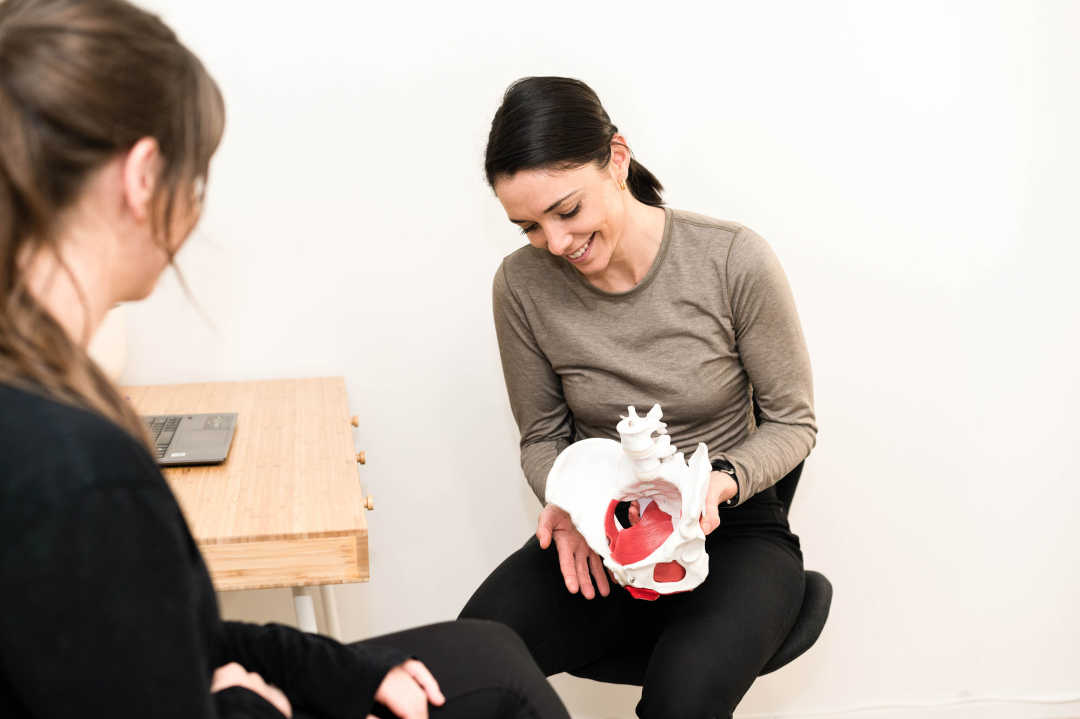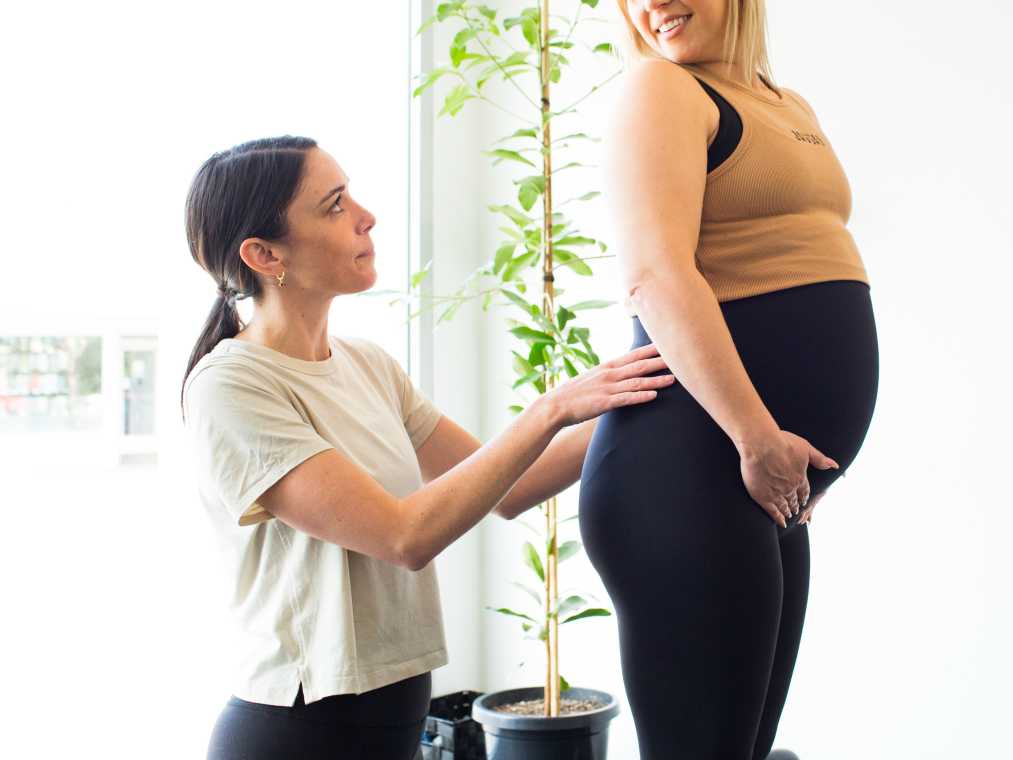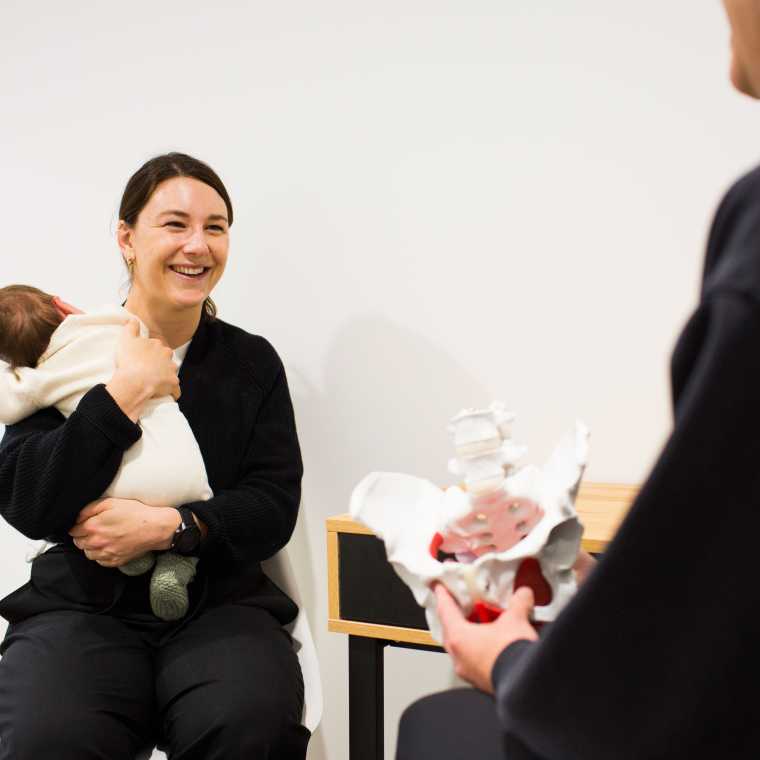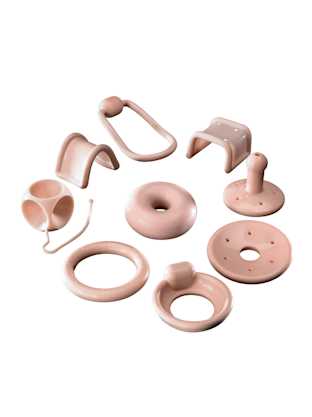Women's and pelvic health physiotherapy

Looking for a pelvic floor physio in Christchurch? Four specialises in the management of all women's health physiotherapy and pelvic floor physiotherapy concerns. Our team of experienced physiotherapists here in Christchurch are passionate about working alongside you to support you to stay comfortable, confident and active throughout the different stages of life. This includes prenatal physiotherapy and postnatal physiotherapy, pelvic health physiotherapy for endometriosis or pelvic pain, and post menopause concerns.
We are ACC registered and are able to lodge and provide care for all ACC maternal birth injuries that occurred after the first of October, 2022.
Physiotherapy for women's health and pelvic floor
Pelvic health physiotherapy (also known as pelvic floor physiotherapy or women's health physiotherapy) at Four is a specialised service to help those of all ages who may be experiencing symptoms or concerns surrounding their pelvic health.
Our experienced women’s and pelvic health physiotherapists here in Christchurch will take the time to establish your goals, carry out a comprehensive evidence based assessment, and work alongside you to build a management plan that will work for your individual lifestyle.
Postnatal physiotherapy assessments - pelvic floor checks, diastasis recti, return to exercise after having a baby
Pregnancy physiotherapy assessments - pelvic floor preparation for birth, safe exercise, support garments
Pelvic pain - including painful sex, vaginismus, vulvodynia or pain from endometriosis or adenomyosis
We are skilled in managing a wide range of presentations, including:
Urinary incontinence can include bladder leakage of any kind, stress incontinence with jumping, coughing or sneezing, or urgency. We also manage those with symptoms of increased urinary frequency.
Urinary incontinence is a symptom that women of many ages experience. The good news is that you don’t have to put up with this! A pelvic floor physiotherapist can help you to establish why you are leaking, and then work with you to reduce symptoms.
Some examples of common causative factors associated with incontinence include pelvic floor muscles weakness, injury to the pelvic floor muscles following childbirth, or hormonal changes that with menopause.
Treatment options may include pelvic floor muscle training, core muscle training, bladder and bowel education and lifestyle changes, the use of topical oestrogen creams, or referral on to trusted doctors, urologists and gynaecologists as needed.
Symptoms such as bowel urgency, fecal or wind incontinence, and constipation are just some of the many bowel related concerns that we can help you to manage. A pelvic floor physiotherapist will establish why your symptoms are occurring, and will work alongside you to develop a management plan that suits your lifestyle.
Bowel control may be altered following childbirth or during times of hormonal fluctuations such as during menopause. Many women who suffer from endometriosis also experience symptoms of IBS or irritable bowel syndrome.
Physiotherapy management may include pelvic floor muscle training, abdominal release work including abdominal fascia release, exercise prescription and lifestyle modifications such as toileting considerations. We also work closely with local dieticians, doctors and colorectal specialists as needed.
Pelvic organ prolapse is referred to as the symptomatic dropping down of one or more pelvic organs. These include the bladder, uterus or rectum. This is an uncomfortable symptom for many women, and there are many treatment options to consider.
Pelvic organ prolapse may occur following childbirth, during/post menopause, or as a result of chronic constipation.
Physiotherapy treatment for prolapse includes lifestyle changes, pelvic floor exercises and bowel/bladder management. We can also discuss the use of pessaries to support your prolapse.
Pelvic pain during pregnancy can be an unwanted symptom for most! Pain may present at the back or the front of the pelvis and will often be worse with single leg activities. Diagnosis may often include sacroiliac joint pain, pubic symphysis pain, or coccyx pain/coccydynia.
All of our women’s health physiotherapists at Four have a musculoskeletal background, which means that we are skilled in pelvic girdle pain management and can apply evidence based treatment options to reduce pain and discomfort during your pregnancy.
Management may include exercise prescription, soft tissue massage, support belts and abdominal support garments. We will also teach you how to move comfortably throughout the day to reduce symptoms with activities such as rolling in bed, getting dressed or walking.
Diastasis recti is a normal occurrence during pregnancy, and can often remain following childbirth. At Four, our women's health physios will educate our clients on the importance of good quality core and pelvic strengthening exercises to support this area, and guide you through a return to sport and exercise plan.
The pelvic floor muscles are just like any other muscle in the body. This means that they can be trained to be stronger, faster or more coordinated. Depending on your concerns or symptoms, we can tailor a pelvic floor exercise program to suit your lifestyle.
To learn how to perform a good pelvic floor squeeze - read our blog here.
The current guidelines suggest that all women who are pregnant with an uncomplicated pregnancy participate in regular exercise where possible. This includes a combination of resistance and aerobic based training. We are aware of these specific types of exercise and muscle groups should be targeted during this time, and are skilled in creating safe and effective exercise programs to suit. We also offer pregnancy reformer Pilates classes - find out more here.
Following childbirth, it is important to seek advice from a pelvic floor physiotherapist to help to get you back to the movement and exercise that you love. We understand that every pregnancy, labor and recovery is different and will therefore spend time to learn about your journey and goals. We also offer postnatal reformer Pilates classes - more out more about these here.

Prenatal physiotherapy
The female body is incredible, and pelvic floor physiotherapy should be included as part of your pregnancy journey to support it. Throughout pregnancy, your body undergoes many changes to accommodate for a growing baby. This can include changes to posture, abdominal muscles and the pelvic floor muscles. Our pregnancy pelvic floor physiotherapy service includes the assessment of pelvic floor and abdominal muscle changes, management of any new symptoms of concerns you may have, and the assessment and management of pelvic girdle pain. We also provide education on preparing your body for labour including pelvic floor relaxation and breathing exercises, perineal stretching, and birth positions and stretches.

Postnatal physiotherapy
Looking for a postnatal pelvic floor physiotherapist in Christchurch? We understand that every woman has had a different experience through pregnancy, labour and into their fourth trimester. Our experienced women’s and pelvic health physiotherapists in Christchurch are here to guide you safely through this journey - ensuring you return to daily life and movement comfortably and with confidence.

Pelvic pain physiotherapy
Pelvic pain is not something that you should have to put up with at any stage of your life. Our experienced pelvic health physiotherapists at Four are here to help and are skilled in the assessment, diagnosis and management of many pelvic pain conditions.
We work closely alongside Christchurch gynaecologists, GP’s, dieticians and other health professionals to ensure that you are receiving the best possible assessment and treatment plan.
Reformer Pilates class timetable
Some of our reformer Pilates classes are designed specifically for our women's health clients.
A timetable of these specialised classes is below.
Class information
Difficulty: All levels
Four’s pregnancy reformer Pilates classes are run by our Women’s Health physios and pre/post-natal trained instructors. During pregnancy it is important to stay active and strong, and reformer Pilates is a fun and safe way to achieve this.
These classes are aimed at strengthening and stabilising the key muscle groups required to help you to stay comfortable and confident throughout your pregnancy and into the fourth trimester. Key focus areas include the pelvic floor, postural muscles, hips, legs and upper body.
No previous Pilates experience is required. As our instructors are qualified Women’s Health physios and Pilates instructors, we are able to cater to any specific needs or concerns so please let us know at your first session if this applies to you.
Difficulty: All levels
Congratulations on welcoming your little one into the world! Now it’s time to start your return to exercise journey with a postnatal reformer Pilates class, run by our qualified Women’s Health physios and pre/post-natal trained instructors - bubs are welcome!
We are here to guide you through a safe return to exercise following vaginal delivery or C-section. We focus on areas including the pelvic floor, abdominal strengthening, upper body and pelvic/hip stability.
No previous Pilates experience is required, however we do highly recommend (not mandatory) that all class members book a postnatal physiotherapy consultation prior to attending their first class. If you haven’t booked yours in yet, click the "Book now" button to make a booking with one of our Women’s Health physios.
Pricing
Women's and pelvic health initial consultation
60 minute appointment - women's health or pelvic health. Private and ACC options.
Women's and pelvic health follow up consultation
30 minute appointment - for all women's health and pelvic health follow up appointments. Private and ACC options.
Frequently asked questions
Maternal birth injuries that occur on or after the 1st Oct 22 will now be acknowledged by ACC. Depending on the specific injury, your midwife, doctor or women's health physio at Four can lodge a claim on your behalf.
If you are unsure and would like to know prior to booking your appointment, please feel free to contact us and we would be more than happy to advise!
Prenatal assessments are always advised for soon to be mums and can be carried out during the second and third trimester. We suggest booking in at around 16-18 weeks gestation - or earlier if there is anything that you are particularly concerned about.
These appointments are here to help advise you on safe exercise during pregnancy, pelvic floor exercises and to provide relief from any aches or pains that you might be experiencing as your body changes.
Any time from 6 weeks post delivery (vaginal or c section) is a great time to book in for a postnatal physiotherapy appointment. If there is something that you are particularly concerned about prior to this, please give us a call/email and we might consider an earlier session.
A postnatal appointment will involve a full history including information about your pregnancy, delivery and initial recovery. We may ask questions about your bladder/bowel function and exercise goals.
These appointments will often involve a physical assessment, please speak to your physiotherapist if you are concerned about this.
Please do! We love meeting your wee ones and having a snuggle so feel free to bring bubs along to your appointment as needed.
Pelvic floor assessments will often involve an internal vaginal exam to assess the strength, mobility and coordination of your pelvic floor muscles and the surrounding fascia. Your informed consent will always be gained prior to any examination, following the discussion of any concerns that you may have.
The Four team are busy bees! Which means our diaries can get booked up, sometimes weeks or even months in advance! We apologise for this, and aim to do everything we can to accomodate to the needs of our Four clients.
If you are struggling to find a time that works for you, don't hesitate to contact us via phone call or email. We have a cancellation list which we can add you to, and we will let you know if an earlier appointment time becomes available.
For general physiotherapy bookings for acute injuries, we aim to hold some last minute appointments each week, these may not be visible in our online booking system, so once again please get in touch if you are in need of an urgent appointment!
